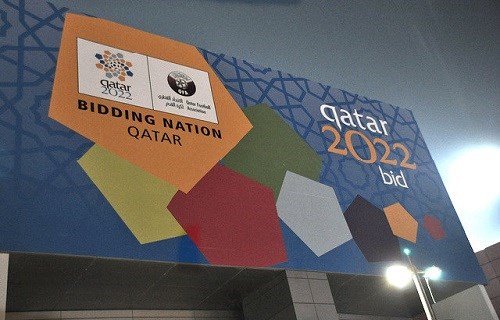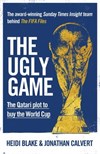Book review: The Ugly Game

Did Qatar really buy the World Cup? Andreas Selliaas has read "The Ugly Game" Photo: Aslan Media/Flickr
02.06.2015
By Andreas SelliaasJust before last weeks’ opening of the FIFA Congress in Zürich – where Sepp Blatter was re-elected as FIFA president – Swiss authorities arrested several FIFA top officials at the request of US authorities on suspicion of corruption. One of the main reasons why the Swiss authorities were able to take this step in 2015 is the continous and notorius work of commited journalists to uncover the truths in the corridors of FIFA HQ and the information provided by such journalists as Jens Weinreich and Andrew Jennings. Trough the book ‘The Ugly Game’, we can add to the list of important journalism disclosing corruption during the reign of FIFA boss Sepp Blatter.
The Ugly Game is the book about the series of articles published last summer in The Sunday Times under the headline ‘The FIFA Files’. The book is written by the two British journalists Heidi Blake and Jonathan Calvert and their articles – and now this book – further manifest The Sunday Times as one of the leading forces in the fight against FIFA corruption.
‘The FIFA Files’-articles shook the walls of FIFA and – together with information from former crooks of the FIFA, like Chuck Blazer and Jack Warner, confessing to corruption – have now led the US government to look into the monkey business of FIFA with the help of Swiss authorities.
FIFA and international football is rotten to the core. This is well documented in ‘The Ugly Game’. The book gives a unique insight into the money that flows around in international football and the dirty morals of virtually anyone who has a connection to FIFA. The aim of the book is to show that the 2022 World Cup in Qatar was bought by the Qataris with Muhammed Bin Hammam as the Chief of Corruption through intricate straw companies and masterful power play making Frank Underwood in House of Cards look like a rookie.
Although the book does not quite manage to substantiate that the Wold Cup was in fact bought (in judicial terms), the book shows that the FIFA system is more than corrupt.
The authors of the book, Heidi Blake and Jonathan Calvert, are two of Britain's most renowned investigative journalists and were both associated with The Sunday Times Insight – the paper’s investigative group – ahead of the World Cup in Brazil in 2014.
At the beginning of 2014 – three years after Qatar was awarded the 2022 World Cup – the two experienced journalists got an unusual opportunity. A source they had used on several occasions gave them a call and told them that a whistleblower inside the Qatari bid committee could provide them with comprehensive documentation describing all the circumstances surrounding Qatar's road to winning the right to host the World Cup in 2022.
An eye-opener
The whistleblower had collected millions of documents (bank statements, e-mails, faxes, phone logs, letters and receipts) which he gave the two journalists access to for three months at a secret location outside London and on the condition that they could tell nobody, not even their own family.
The material was so extensive that they had to hire an expert in data search and data systematisation to get anything out of the material. The law of large numbers almost took stranglehold on them before they had even begun. The load of information was that massive.
And what they document in this book after endless decoding of material, something that would have posed problems to even auditors of large-scale businesses, should shock most and be an eye-opener for all those who are still caught in the fog thinking that football and politics do not mix.
The book describes the fall of the mighty football boss Mohammed Bin Hammam of Qatar. Bin Hammam helped FIFA president Sepp Blatter to the throne in 1998, he sat on the FIFA Executive Committee and was president of the Asian Football Federation (AFC) and is considered to be the architect of Qatar's successful campaign to get the World Cup in 2022.
Today Bin Hammam finds himself without any football duties at all and is stripped of all honour. Six months passed from when he was hailed as the Master of Qatar’s World Cup until he sat alone and friendless in his big house in Doha, Qatar. Today, hardly anybody knows where to find him.
Others should have been dethroned as well
After reading the book, it is my impression that more people should have been stripped of glory in international football. UEFA president Michel Platini is presented as a man of questionable character. Frans Beckenbauer (member of FIFA) likewise. Jack Warner (former vice-president of FIFA and the American confederation (CONCACAF)) and Chuck Blazer (former FIFA Executive Committee and General Secretary of CONCACAF) are demonstrably. And further 30-40 football officials in Asia, Latin America and Africa should be subjects of police investigation if the details in the book are true. And I believe they are.
But transactions and meetings to get the World Cup do not only involve football officials. The documents also reveal gas agreements between states, fighter plane purchases and the souverignty issues of the Falkland Islands, just to name a few. The book should lay the ground for its own research in international politics. And it should start a debate on politicians' role in the World Cup bidding.
On the other hand, the book provides a unique insight into the journalistic craftmanship. Jonathan Calvert is known for his revelations using hidden cameras and false identities, something which is also described in ‘The Ugly Game’. This way, the book also offers a fascinating look into the more extreme forms of journalism, an insight that should interest anyone who wants to discuss journalistic methods in cases where it is very difficult to gain access to those under investigation.
But did he buy the World Cup?
The really big question is still whether Mohammed Bin Hammam bought the World Cup or not and whether the book manages to prove it. The impression that I am left with is that the book really only proves that Bin Hammam spent a lot of money on corrupt football bosses around the world – ‘charity’ as he perceived it himself – and that it is difficult to see that these payments alone secured Qatar the World Cup. The investigation under way will prove if I am wrong.
Further, this is also a story, in my opinion, of a man wanting to take the power from Sepp Blatter. Mohammed Bin Hammam challenged Sepp Blatter before the last FIFA presidential election in 2011. An election from which he withdrew because of allegations of corruption in connection to Qatar's campaign. In other words, Blatter used the mess surrounding Qatar to get rid of his worst opponent, his own 1998 kingmaker.
In this book, Mohammed Bin Hamman is portrayed as the big villain, while everyone knows that Sepp Blatter is the real bandit. Or do we really know? In fact, there is surprisingly little evidence that Sepp Blatter is corrupt or that he has received money. This goes for ‘The Ugly Game’ as well.
That Blatter is a power politician, there is no doubt. Nor that he uses harsh methods to get what he wants. Therefore, we need whistleblowers who provide information about all the people around Sepp Blatter.
Dare we hope for a ‘The Ugly Game II’ dealing with Sepp Blatter's secret files?
Nevertheless, it is hard to believe that money had nothing to say when the World Cup hosts in 2018 and 2022 were elected (they were elected at the same time in December 2010) and that Sepp Blatter is ignorant to what goes on around the World Cup in Qatar.
It is quite obvious that Qatar spent much more money on their World Cup application than all the other candidates and it also clearly appears that Qatar was better at identifying all the 24 FIFA Executive Committee members in control (those who would decide who to award the World Cup hosting rights) than all the other candidates.
If what this book describes is corruption in order to win the World Cup hosting rights, the impression that I am left with is that Qatar was better at corruption than the other applicant countries. All candidate countries attempted to establish voting alliances and offered gifts they would not normally offer.
The big revelation in the book – a part from the way that the journalists gained access to their material and the way that they worked with it – is the authors’ attack on Michael Garcia, the American in charge of FIFA’s investigation into the corruption allegations against Qatar, who resigned because he found FIFA’s presentation of his summary wrong. Blake and Calvert claim that Garcia is lying and that he did not follow up on the leads that they provided him with. I am waiting for his reaction to this claim.
One of the biggest surprises in the book is perhaps that sex plays such a small part of the game to get the World Cup. ‘Honey traps’ are a wellknown phenomenon in international politics, but not in FIFA? Either the football family lacks potency or this book also shows that documents cannot always reveal what goes on in the game surrounding the World Cup and FIFA.
The work that Heidi Blake and Jonathan Calvert have done has already caused chockwawes in FIFA and this book will enlighten everybody interested in in-debth knowledge of what is going on behind the hidden walls of FIFA.
After the arrests in Zürich and the forthcoming investigation of the 2018 and 2022 bidding processes, two questions arise: Will this be the beginning of the end for Sepp Blatter and will Qatar be stripped of the right to host the World Cup? The findings in ‘The Ugly Game’ provide a good basis for trying to answer these questions.
More information
 The Ugly Game
The Ugly Game
The Qatari Plot to Buy the World Cup
By Heidi Blake and Jonathan Calvert
Simon & Schuster UK
April 2015
ISBN 9781471149368





